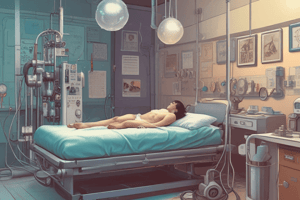Podcast
Questions and Answers
What is the typical shape of the nucleus in Eosinophils?
What is the typical shape of the nucleus in Eosinophils?
- Bilobed (correct)
- Tri-lobed
- Unsegmented
- Irregular
What is the color of the cytoplasmic granules in Basophils?
What is the color of the cytoplasmic granules in Basophils?
- Red-orange
- Yellow
- Deep blue
- Deep purple (correct)
What is unique about the shape of Monocytes?
What is unique about the shape of Monocytes?
- Tri-lobed
- S-shaped
- Kidney-shaped (correct)
- Circular
What is the characteristic of the cytoplasm in Monocytes?
What is the characteristic of the cytoplasm in Monocytes?
What is the color of the nucleus in Eosinophils?
What is the color of the nucleus in Eosinophils?
Which of the following is NOT a characteristic of Basophils?
Which of the following is NOT a characteristic of Basophils?
What is the name of the university where the Anesthesia Technology Department is located?
What is the name of the university where the Anesthesia Technology Department is located?
Who is the assistant lecturer in the Anesthesia Technology Department?
Who is the assistant lecturer in the Anesthesia Technology Department?
What is the topic of the lecture?
What is the topic of the lecture?
What is the number of the lecture?
What is the number of the lecture?
What is the name of the person associated with the Anesthesia Technology Department?
What is the name of the person associated with the Anesthesia Technology Department?
What is the primary purpose of preparing a blood smear?
What is the primary purpose of preparing a blood smear?
What is the name of the stain used in the procedure?
What is the name of the stain used in the procedure?
What is the source of the sample used in the procedure?
What is the source of the sample used in the procedure?
Where can the procedure of preparing a blood smear and staining it with Leishman be found?
Where can the procedure of preparing a blood smear and staining it with Leishman be found?
What is the benefit of staining the blood smear with Leishman?
What is the benefit of staining the blood smear with Leishman?
What type of infection is associated with an increase in eosinophils?
What type of infection is associated with an increase in eosinophils?
What is the characteristic feature of neutrophils' nucleus?
What is the characteristic feature of neutrophils' nucleus?
Which type of infection causes an increase in lymphocytes?
Which type of infection causes an increase in lymphocytes?
What is the characteristic feature of neutrophils' cytoplasm?
What is the characteristic feature of neutrophils' cytoplasm?
Which type of leukemia is associated with an increase in monocytes?
Which type of leukemia is associated with an increase in monocytes?
What is the characteristic feature of appendicitis?
What is the characteristic feature of appendicitis?
What is the purpose of counting 100 WBCs on the slide?
What is the purpose of counting 100 WBCs on the slide?
What is the tool used to record the number of WBCs counted?
What is the tool used to record the number of WBCs counted?
What is the next step after counting 100 WBCs?
What is the next step after counting 100 WBCs?
What is the significance of the number 100 in the WBC counting process?
What is the significance of the number 100 in the WBC counting process?
What is the final product of the WBC counting and calculation process?
What is the final product of the WBC counting and calculation process?
Flashcards are hidden until you start studying
Study Notes
White Blood Cells (WBCs)
- Bacterial infections, appendicitis, and allergy cause an increase in neutrophils
- Parasitic infestation and allergy cause an increase in eosinophils
- Viral infections cause an increase in lymphocytes
- Monocytic leukemia causes an increase in monocytes
Characteristics of WBCs
- Neutrophils: have a 3-5 lobed blue-purple nucleus, small pink cytoplasmic granules, and chromatin threads
- Eosinophils: usually have a blue-violet bilobed nucleus, rarely 3-lobed, red-orange coarse cytoplasmic granules, and chromatin threads
- Basophils: have an irregular shape, may be S-shaped, blue-violet un-segmented bilobed nucleus, rarely 3-lobed, and deep blue or deep purple cytoplasmic granules
- Monocytes: are the largest cells in normal blood, have a kidney-shaped form, large pale blue-violet nucleus, and non-granular cytoplasm
Preparation of Blood Smear and Staining
- Prepare a blood smear and stain it with Leishman stain as described in the previous lecture
Calculations
- Count each WBC seen on the slide and record the number on a differential cell counter until 100 WBCs are counted
- Calculate the percentage of each type of WBC by dividing the number of each type by 100
Studying That Suits You
Use AI to generate personalized quizzes and flashcards to suit your learning preferences.




